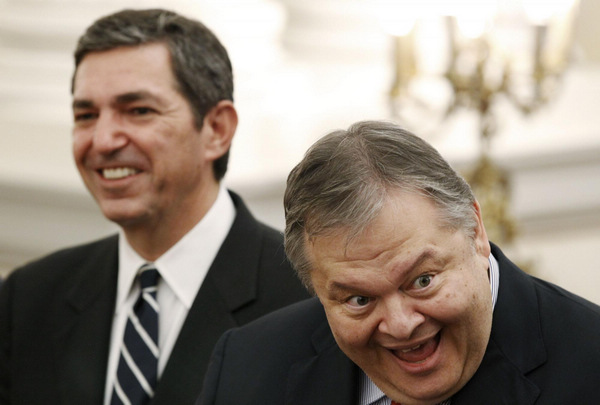Photos
Greek PM sacrifices finance chief, appoints rival
Updated: 2011-06-18 10:38
(Agencies)
ATHENS/BERLIN - Greek Prime Minister George Papandreou sacrificed his finance minister on Friday and put his main socialist party rival into the job in a bid to force through an unpopular austerity plan to avert bankruptcy.
In Berlin, the leaders of Germany and France, Europe's two central powers, called for a quick deal on a second bailout for Greece with voluntary involvement of private bondholders, in accord with the European Central Bank.
"There is no time to lose," French President Nicolas Sarkozy told a joint news conference with Chancellor Angela Merkel.
Both voiced support for Papandreou and said the European Union must go on aiding Greece. But they gave no details of how private investors would contribute to the rescue - an issue that has split the euro zone and rattled financial markets.
Nevertheless, their pledge of an early solution was enough to partially reverse a week-long financial market rout, with the risk premium on Greek and Spanish bonds narrowing and the euro regaining ground against the dollar.
The elevation of Defence Minister Evangelos Venizelos to the finance ministry was aimed at securing party backing for a crucial austerity package required for the EU and IMF to disburse emergency loans to keep Greece afloat next month and avoid a default which could unleash global financial turmoil.
Analysts said the socialist heavyweight was a second-best choice after Papandreou failed to persuade respected former ECB Vice-President Lucas Papademos to come aboard, but it enabled him to dump several ministers who had obstructed reforms.
Outgoing Finance Minister George Papaconstantinou, who negotiated a first 110 billion euro bailout for Athens last year and had the confidence of international lenders and markets, was moved to the environment ministry in a crisis-driven reshuffle.
"Venizelos is politically powerful and that might bode well for the implementation of fiscal consolidation, even though he has no track record in financial matters," UBS analyst Alexander Kyrtsis said.
Initial Greek market reaction was positive with bank shares rising by as much as 4 percent and the Athens stock market index up 2 percent.
But bond markets remain spooked by fears of a Greek default and most economists are overwhelmingly sceptical that Greece can ever repay its debt mountain, which has reached 340 billion euros or 150 percent of the country's annual economic output.
Reuters' calculations based on 5-year credit default swap prices from Markit show an 81 percent probability of Greece eventually defaulting on its debt based on a 40 percent recovery rate.
The ECB and the European Commission have warned that any form of private sector involvement that causes a "credit event" or a downgrading of Greek debt to default status could wreak devastating damage on the euro zone.
E-paper

Pret-a-design
China is taking bigger strides to become a force in fashion.
Lasting Spirit
Running with the Beijingers
A twist in the tale
Specials

Mom’s the word
Italian expat struggles with learning English and experiences the joys of motherhood again.

Lenovo's challenge
Computer maker takes on iconic brand apple with range of stylish, popular products

Big win
After winning her first major title, Chinese tennis star could be marketing ace for foreign brands

